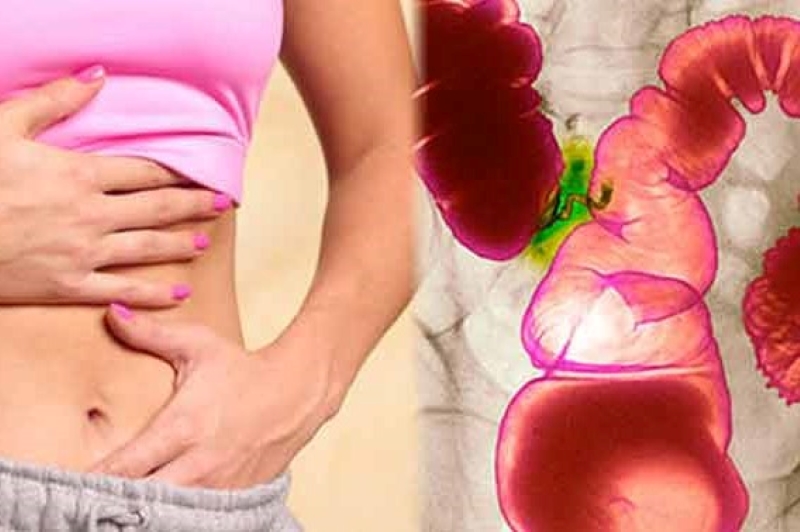
Irritable bowel (colitis): diagnosis, symptoms and treatment
Irritable bowel syndrome (IBS = irritable bowel syndrome) is a chronic disease affecting the last tract of the intestine, called the colon
Peculiarities of irritable bowel syndrome
It is characterised by abdominal pain and discomfort, altered passage of stools (incomplete evacuation/effort/urgency) and production of mucus in the stools.
The most affected age group is between 20-50 years.
The condition persists continuously for at least three months and is often associated with bloating, meteorism, flatulence, nausea, headache, anxiety, tiredness, depressed mood, sleep disturbances and difficulty concentrating.
Bowel activity is often characterised by alternating periods of constipation and diarrhoea.
In some cases of irritable bowel syndrome, the pain is intermittent and resolves with defecation. In others, ‘urgent’, non-painful diarrhoea is noted at mealtimes.
Commonly referred to as colitis, a generic term for inflammation of the colon.
Although in reality there are several different types, psychosomatic colitis (or irritable bowel syndrome) is the most common (and rapidly increasing in the population).
Traditionally, in medicine, irritable bowel syndrome is a diagnosis of exclusion.
In the absence of a laboratory test that can detect colitis, it remains an undefined condition that is often difficult to diagnose.
IBS symptoms differ from person to person
This makes diagnosis more difficult for the doctor, who must exclude similar pathologies such as diverticulitis, Crohn’s disease, etc.
Causes of irritable bowel syndrome
The causes that cause this disease are still not entirely clear, although the results of numerous scientific studies now seem to indicate a direct correlation between psychosomatic colitis and the repetition over time of conditions of stress, anxiety, negative emotions in the patient’s life.
These psychological factors would in turn be intensified by a sedentary lifestyle, disordered and low-fibre diet, alcohol and caffeine intake, and smoking, situations that are very common in our society.
The literature shows that the psychological set-up of the subject plays a decisive role in the pathogenesis of colitis.
Perfectionism, self-criticism, catastrophism and difficulty in expressing needs and emotions represent personality traits often associated with the syndrome.
Stress also appears to be a precipitating factor in the onset of the disease itself.
The latter, if repeated, could lead to a weakening of the immune system, hypersensitivity of the colon and an increased likelihood of infection.
These are all aspects that are found in patients suffering from the disease and explain its causes.
Finally, the symptoms themselves may be the cause of anxiety, negative emotional states that feed and maintain the vicious circle underlying the syndrome.
Finally, a genetic predisposition could be a factor in the individual’s inherent vulnerability to IBS (involvement of chromosome 9 and oestrogen has been hypothesised).
Irritable bowel syndrome (or colitis), therefore, is now considered a non-organic-based disorder and is part of that wide range of psychosomatic disorders.
The 2-brain theory recognises a connection between the central nervous system and the gut that well describes the link between psyche and soma inherent in this syndrome.
Treatment of irritable bowel syndrome
There is no 100% effective cure and the treatment of psychosomatic colitis is mainly aimed at reducing the symptoms of irritable bowel syndrome.
It is useful to modify the diet, introducing a higher intake of fibre and liquids, and avoiding risky foods (e.g. mature cheese, sausages, fruit with seeds, melon, legumes, citrus fruits, mushrooms and fizzy drinks).
It is also necessary to change one’s lifestyle by increasing physical exercise.
Medications such as antispastics, anti-diarrhoeics and laxatives should be limited to the actual need in times of acute crisis.
They should not be used for too long as they are addictive.
In general, however, these indications have modest and temporary effects.
The treatment of irritable bowel syndrome inevitably passes through a good course of psychotherapy.
Through this, the patient can learn stress management strategies and identify the factors that maintain hyperactivation of the autonomic nervous system.
The latter is in fact responsible for the involuntary contractions of the intestinal musculature, which produce the symptoms of colitis.
Read Also
Emergency Live Even More…Live: Download The New Free App Of Your Newspaper For IOS And Android
Irritable Bowel Or Other (Intolerances, SIBO, LGS, Etc.)? Here Are Some Medical Indications
Slow Metabolism: Can It Depend On The Thyroid?
Wales’ Bowel Surgery Death Rate ‘Higher Than Expected’
Irritable Bowel Syndrome (IBS): A Benign Condition To Keep Under Control
Intestinal Infections: How Is Dientamoeba Fragilis Infection Contracted?
Irritable Bowel Syndrome (IBS): A Benign Condition To Keep Under Control
Gastroesophageal Reflux: Causes, Symptoms, Tests For Diagnosis And Treatment
Non-Hodgkin’s Lymphoma: Symptoms, Diagnosis And Treatment Of A Heterogeneous Group Of Tumours
Helicobacter Pylori: How To Recognise And Treat It
A Baby’s Gut Bacteria May Predict Future Obesity
Sant’Orsola In Bologna (Italy) Opens A New Medical Frontier With Microbiota Transplantation
Microbiota, The Role Of The ‘Gate’ That Protects The Brain From Intestinal Inflammation Discovered
What Are The Differences Between Diverticulitis And Diverticulosis?
When Is A Colonoscopy With Biopsy Necessary?
What Is A Double Contrast Barium Enema?
Study Finds Link Between Colon Cancer And Antibiotic Use
Colonoscopy: What It Is, When To Do It, Preparation And Risks
Colon Wash: What It Is, What It Is For And When It Needs To Be Done


